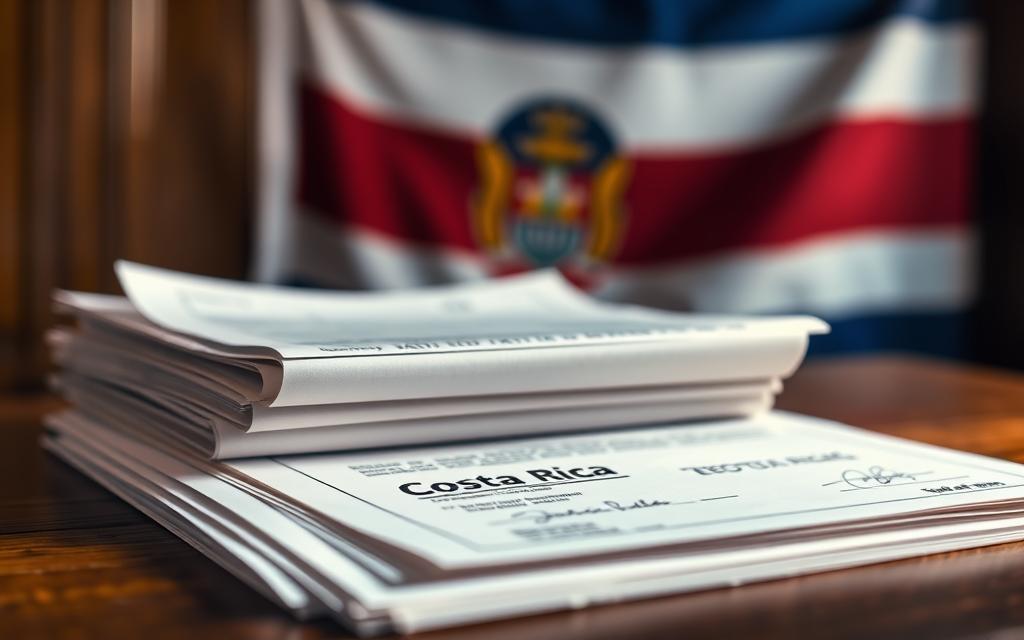
Equity Lending Documentation Costa Rica: Secure Investments
GAP Investments provides tailored financing solutions for private investors interested in Costa Rica, understanding the unique needs of foreign and expat investors. With a strong focus on safety and risk management, they offer a secure investment environment.
Over 700 investors from North America and Europe are actively involved in Costa Rica’s private lending market, highlighting the growing interest in financial opportunities in this vibrant country. Proper documentation is essential for securing equity loans and creating a safe investment environment for foreign investors.
Understanding local regulations and documentation requirements is crucial before engaging in equity lending in Costa Rica. GAP Investments helps investors navigate these requirements to ensure secure and profitable investments.
The Costa Rican Equity Lending Landscape
Costa Rica’s equity lending market is experiencing significant growth, driven by its stable economy and thriving real estate sector. As a result, foreign investors are increasingly looking to capitalize on the opportunities available in this market.
Current Market Overview
The current market overview for equity lending in Costa Rica is characterized by a growing demand for financing options, particularly among foreign investors. GAP Investments provides tailored financing for private investors interested in Costa Rica, understanding the unique needs of foreign and expat investors. Our loans range from $50,000 to over $3,000,000 USD, with competitive interest rates of 12% to 18% annually.
For foreigners, building credit in Costa Rica can be challenging but rewarding. A strong credit history opens doors to better financing options, whether for real estate or business investments. It also helps secure favorable interest rates and terms.
Growth Opportunities for Foreign Investors
Foreign investors can leverage equity loans to diversify their investment portfolios while gaining exposure to the thriving Costa Rican property market. The competitive advantages foreign investors have when entering the Costa Rican equity lending space include access to capital and international banking relationships.
- Access to a stable economy with growing real estate opportunities
- Competitive interest rates ranging from 12% to 18% annually
- Loan options from $50,000 to over $3,000,000 USD
- Opportunities to diversify investment portfolios
By investing in Costa Rica’s equity lending market, foreign investors can benefit from the country’s economic stability and property value appreciation. For more information on how to get started, visit our thank you page for additional resources.
Understanding Equity Loans in Costa Rica
Equity loans in Costa Rica offer a unique financing solution for investors and property owners. These loans allow individuals to leverage the equity in their properties to secure funding for various purposes.
How Equity Loans Work
Equity loans are financial products that enable property owners to borrow money using the equity in their property as collateral. In Costa Rica, these loans are available from private lenders, offering an alternative to traditional bank financing. The loan amounts can range from $50,000 to over $3,000,000 USD, with competitive interest rates between 12% to 18% annually.
The terms for equity loans in Costa Rica can vary, typically ranging from six months to three years. This flexibility makes them attractive to borrowers who need capital for different durations.
Benefits Compared to Traditional Financing
Equity loans offer several benefits compared to traditional financing options. Firstly, they often come with more competitive interest rates, making them more affordable. Additionally, the interest paid on these loans may be tax-deductible, providing further savings.
Another significant advantage is the fast processing time. Many private lenders in Costa Rica can approve and fund equity loans in as little as 7 to 10 business days, which is considerably faster than traditional bank loans. This rapid processing, combined with the potential for more flexible terms and lower interest rates, makes equity loans an attractive option for those seeking financing in Costa Rica.
Essential Documentation for Equity Lending in Costa Rica
For investors looking to leverage their property in Costa Rica, understanding the essential documentation is key to a smooth equity lending process. The documentation required can be broadly categorized into personal identification, financial, and property documentation.
Personal Identification Requirements
To initiate the equity loan application process in Costa Rica, applicants must provide valid personal identification. This typically includes a passport for foreigners or a cédula for residents. The identification document must be current and not near expiration. In some cases, additional identification such as a driver’s license may be required.
- Valid passport or cédula
- Proof of residency (utility bills or rental agreement)
- Additional identification documents as required by the lender
Financial Documentation
Financial documentation is crucial for determining the creditworthiness of the applicant. This includes providing proof of income, bank statements, and tax returns. Lenders use this information to assess the applicant’s ability to repay the loan.

- Proof of income (pay stubs, employment letter)
- Bank statements showing financial stability
- Tax returns for the past few years
Property Documentation
The property documentation is perhaps the most critical aspect of the equity lending process. It involves providing documents that prove ownership and the value of the property. Key documents include the registered title (escritura), property survey (plano catastrado), and property tax payment receipts. A clean title report (estudio registral) is also essential to ensure there are no liens or encumbrances on the property.
- Registered title (escritura)
- Property survey (plano catastrado)
- Property tax payment receipts
- Clean title report (estudio registral)
- Property valuation reports
By understanding and preparing these essential documents, applicants can streamline their equity loan application process in Costa Rica, making it more likely to be approved.
Navigating Residency Status and Its Impact on Borrowing
The impact of residency status on borrowing is a critical consideration for those seeking equity loans in Costa Rica. Residency status can significantly influence the availability of loan options and the terms offered by lenders.
Options for Permanent Residents
Permanent residents in Costa Rica have access to a broader range of equity loan options. They can approach traditional banks and private lenders for financing, with terms often more favorable due to their established residency status. For instance, GAP Investments provides tailored financing solutions for private investors, understanding the unique needs of foreign and expat investors.
- More favorable loan terms due to established credit history
- Access to a wider range of lenders, including traditional banks
- Potential for lower interest rates compared to non-residents
Solutions for Non-Residents and Foreigners
Non-residents and foreigners can also secure equity loans in Costa Rica, although the process may be more complex. Private lenders like GAP Investments offer specialized loan programs designed to overcome the limitations imposed by traditional banks. To learn more about the required documents for borrowing, visit GAP Investments.
- Alternative documentation options for non-residents without local credit histories
- Leveraging international assets and income sources to qualify for loans
- The role of local representatives or attorneys-in-fact in facilitating the loan process
Loan-to-Value Ratios and Property Valuation
The loan-to-value ratio is a critical component in Costa Rica’s equity lending landscape, affecting both lenders and borrowers. In Costa Rica, LTV ratios typically range from 50% to 80%, meaning property owners can borrow up to 80% of their property’s value.

How LTV Affects Interest Rates
The loan-to-value ratio significantly impacts the interest rates offered on equity loans in Costa Rica. Generally, lower LTV ratios result in more favorable interest rates, as they pose less risk to lenders. Our loans range from $50,000 to over $3,000,000 USD, with competitive interest rates of 12% to 18% annually, with the rate of 12% and up based on the LTV and other factors.
For instance, a property owner with a lower LTV ratio may qualify for an interest rate closer to 12%, while those with higher LTV ratios might be offered rates towards the upper end of the spectrum.
Property Appraisal Process
The property appraisal process is a crucial step in determining the value of a property for equity lending purposes in Costa Rica. Professional appraisers use various methodologies, including comparative market analysis, replacement cost assessment, and the income approach for investment properties, to arrive at an accurate valuation.
- Qualified appraisers consider unique local factors such as ocean views, access to amenities, and environmental considerations.
- The appraisal process typically takes 5-10 business days and is a critical component of the equity loan application process.
- Appraisal costs vary and are typically borne by the borrower, factoring into the overall loan fees.
Lenders rely on appraisal reports to make final loan decisions, sometimes applying risk adjustments to the appraised value. Property owners can prepare for appraisals by making minor improvements and gathering documentation of recent upgrades, potentially maximizing their property’s assessed value.
The Application Process with GAP Investments

The application process with GAP Investments is designed to be efficient and hassle-free for foreign investors. GAP Investments understands the unique needs of international investors looking to secure equity loans in Costa Rica.
Step-by-Step Application Guide
GAP Investments offers a straightforward application process that can be completed in a few steps. First, applicants submit their initial documentation, including personal identification, financial information, and property details. The GAP Investments team then conducts an initial review, typically within 1-2 business days, to ensure all necessary information is provided.
Next, a property valuation is conducted, usually taking 3-5 business days, to assess the value of the collateral. Following this, the underwriting process, which typically takes 2-3 business days, involves a thorough review of the application and property valuation. Finally, the loan is closed and funded within 1-2 business days.
Processing Times and Approval Rates
GAP Investments is known for its quick processing times, with loan approvals often granted within 7 to 10 business days. This efficiency is due to their streamlined procedures and focus on property value rather than credit history, making them an attractive option for foreign investors. In contrast, traditional banks in Costa Rica can take months to approve loans.
GAP Investments boasts higher approval rates compared to traditional lenders, as their focus is on the property’s value rather than the borrower’s credit history. This approach benefits foreign investors who may not have an established credit history in Costa Rica.
By understanding the application process and what to expect, borrowers can better prepare themselves for a smooth transaction with GAP Investments.
Interest Rates and Loan Terms Explained
Understanding the intricacies of interest rates and loan terms is crucial for investors looking to secure equity loans in Costa Rica. Equity lending in Costa Rica offers a range of options for investors, with private lenders like GAP Investments providing loans ranging from $50,000 to over $1 million. These loans come with competitive interest rates and flexible terms that cater to various investment strategies.
Factors Affecting Interest Rates
Interest rates for equity loans in Costa Rica are influenced by several factors, including the lender’s risk assessment, the loan-to-value ratio, and the borrower’s creditworthiness. Private lenders typically offer interest rates between 12% and 16% annually, which are higher than those offered by government banks but come with fewer restrictions. The interest rate may also vary based on the term length, with some lenders offering different rates for different term structures.
- Loan-to-value ratio: A lower LTV ratio can result in a lower interest rate.
- Borrower’s creditworthiness: A good credit history can lead to more favorable interest rates.
- Lender’s risk assessment: The lender’s evaluation of the investment’s risk can impact the interest rate.
Flexible Term Options from 6 Months to 3 Years
GAP Investments and other equity lenders in Costa Rica offer flexible loan term options ranging from 6 months to 3 years. Short-term loans are ideal for bridge financing, quick property acquisitions, or renovation projects with a clear exit strategy. Medium-term options (12-24 months) provide a balance between shorter interest exposure and sufficient time for property development or stabilization.
Longer-term loans (3 years) offer greater stability and predictability for borrowers undertaking complex projects or seeking consistent income from rental properties. Borrowers can select the optimal term length based on their investment strategy, cash flow projections, and exit plans. It’s also important to consider prepayment options and any associated penalties when selecting a loan term.
Fees, Closing Costs, and Legal Considerations
When securing an equity loan in Costa Rica, understanding the associated fees and legal considerations is crucial for a smooth transaction. Borrowers must be aware of the various costs involved to make informed decisions.
Typical Fee Structure
The typical fee structure for equity loans in Costa Rica includes origination fees, appraisal fees, and closing costs. These fees can vary depending on the lender and the specific terms of the loan. For instance, GAP Investments offers competitive pricing with transparent fee structures.
Legal Requirements for Loan Documentation
Legal requirements for loan documentation in Costa Rica involve the authentication of documents by a Costa Rican notary (notario público). This specialized attorney has the authority to formalize loan agreements and register property transactions. Ensuring that all documentation is properly handled is essential for securing the loan.
Working with Legal Professionals
Working with qualified legal professionals is vital when securing an equity loan in Costa Rica. They provide expertise in navigating the legal landscape, including issues related to residency status and property rights. Borrowers should verify the credentials of their legal representatives with the Costa Rican Bar Association to ensure they are working with experienced professionals.
By understanding the fees, closing costs, and legal considerations associated with equity loans in Costa Rica, borrowers can better navigate the process and avoid potential pitfalls. Professional guidance from experienced lenders and legal advisors is essential for a successful transaction.
Risk Management and Investment Security
GAP Investments prioritizes risk management to ensure a secure investment environment in Costa Rica. Whether you’re investing in real estate or starting a business, this approach helps you make informed decisions.
How GAP Investments Protects Your Investment
GAP Investments employs a multi-layered risk management strategy to protect your investment. This includes thorough due diligence on potential investments and ongoing monitoring of loan performance.
- Comprehensive property valuation to determine accurate market value
- Robust insurance requirements to mitigate potential risks
- Collateralized loan structures to secure investments
By working with GAP Investments, you can benefit from their expertise in lender services in Costa Rica, ensuring that your investment is protected.
Insurance and Collateral Requirements
Insurance and collateral requirements are crucial components of GAP Investments’ risk management strategy. These requirements help to minimize potential losses and ensure that investments remain secure.
- Standard property insurance covering fire, natural disasters, and liability
- Minimum coverage amounts are calculated as a percentage of the property’s replacement value
- First-position mortgages on Costa Rican real estate to secure loans
- Additional collateral options, such as secondary properties or corporate guarantees
By structuring loans with robust insurance and collateral requirements, GAP Investments provides a secure investment environment for property owners in Costa Rica.
Conclusion: Making Informed Decisions for Secure Investments
As investors navigate the complexities of Costa Rica’s equity lending landscape, informed decisions become crucial for secure investments. With proper documentation and a clear understanding of the process, investors can capitalize on the unique advantages of equity loans in Costa Rica.
Compared to traditional financing, equity loans offer faster processing times, typically within 7-10 business days, and flexible terms ranging from 6 months to 3 years. GAP Investments provides expert guidance through the lending process, ensuring that investors meet all necessary requirements.
Understanding loan-to-value ratios and their impact on interest rates, which range from 12% to 18% annually, is vital for investment security. By working with experienced lenders and legal professionals, investors can navigate potential challenges and create a protected investment environment.
For those ready to explore equity lending opportunities in Costa Rica, GAP Investments offers tailored financing solutions. Contact them at www.gapinvestments.com, +(506)-4001-6413, USA/Canada (855)-562-6427, or [email protected] to take the next step toward achieving your financial goals.
Article by Glenn Tellier (Founder of CRIE and Grupo Gap)
